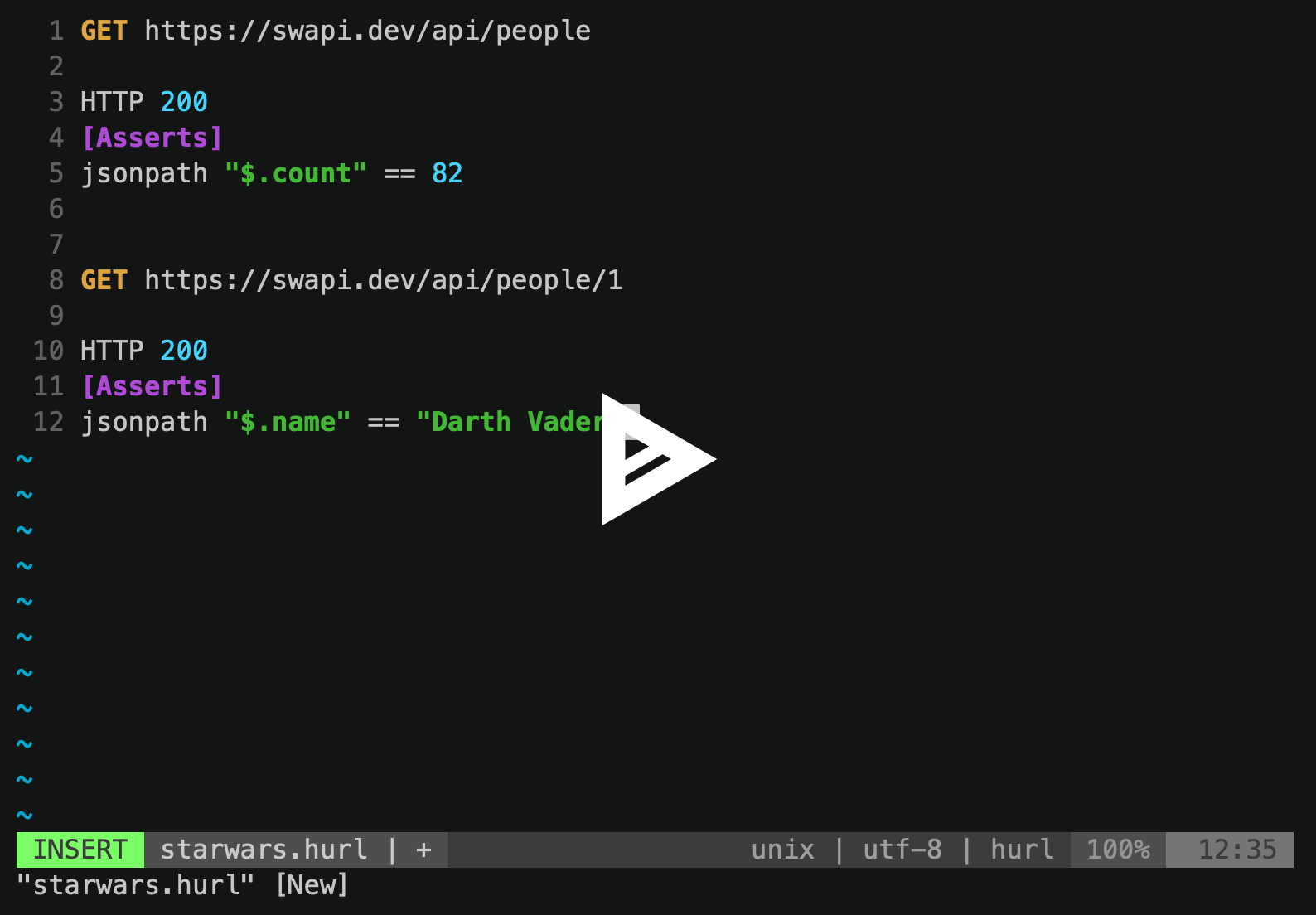# What's Hurl?
Hurl is a command line tool that runs HTTP requests defined in a simple plain text format.
It can chain requests, capture values and evaluate queries on headers and body response. Hurl is very
versatile: it can be used for fetching data, testing HTTP sessions and testing XML / JSON APIs.
```hurl
# Get home:
GET https://example.org
HTTP/1.1 200
[Captures]
csrf_token: xpath "string(//meta[@name='_csrf_token']/@content)"
# Do login!
POST https://example.org/login?user=toto&password=1234
X-CSRF-TOKEN: {{csrf_token}}
HTTP/1.1 302
```
Chaining multiple requests is easy:
```hurl
GET https://example.org/api/health
GET https://example.org/api/step1
GET https://example.org/api/step2
GET https://example.org/api/step3
```
# Also an HTTP Test Tool
Hurl can run HTTP requests but can also be used to test HTTP responses.
Different types of queries and predicates are supported, from [XPath] and [JSONPath] on body response,
to assert on status code and response headers.
 It is well adapted for REST / JSON APIs
```hurl
POST https://example.org/api/tests
{
"id": "4568",
"evaluate": true
}
HTTP/1.1 200
[Asserts]
header "X-Frame-Options" == "SAMEORIGIN"
jsonpath "$.status" == "RUNNING" # Check the status code
jsonpath "$.tests" count == 25 # Check the number of items
jsonpath "$.id" matches /\d{4}/ # Check the format of the id
```
HTML content
```hurl
GET https://example.org
HTTP/1.1 200
[Asserts]
xpath "normalize-space(//head/title)" == "Hello world!"
```
and even SOAP APIs
```hurl
POST https://example.org/InStock
Content-Type: application/soap+xml; charset=utf-8
SOAPAction: "http://www.w3.org/2003/05/soap-envelope"
GOOG
HTTP/1.1 200
```
Hurl can also be used to performance test HTTP endpoints:
```hurl
GET https://example.org/api/v1/pets
HTTP/1.0 200
[Asserts]
duration < 1000 # Duration in ms
```
And response bytes
```hurl
GET https://example.org/data.tar.gz
HTTP/1.0 200
[Asserts]
sha256 == hex,039058c6f2c0cb492c533b0a4d14ef77cc0f78abccced5287d84a1a2011cfb81;
```
# Why Hurl?
It is well adapted for REST / JSON APIs
```hurl
POST https://example.org/api/tests
{
"id": "4568",
"evaluate": true
}
HTTP/1.1 200
[Asserts]
header "X-Frame-Options" == "SAMEORIGIN"
jsonpath "$.status" == "RUNNING" # Check the status code
jsonpath "$.tests" count == 25 # Check the number of items
jsonpath "$.id" matches /\d{4}/ # Check the format of the id
```
HTML content
```hurl
GET https://example.org
HTTP/1.1 200
[Asserts]
xpath "normalize-space(//head/title)" == "Hello world!"
```
and even SOAP APIs
```hurl
POST https://example.org/InStock
Content-Type: application/soap+xml; charset=utf-8
SOAPAction: "http://www.w3.org/2003/05/soap-envelope"
GOOG
HTTP/1.1 200
```
Hurl can also be used to performance test HTTP endpoints:
```hurl
GET https://example.org/api/v1/pets
HTTP/1.0 200
[Asserts]
duration < 1000 # Duration in ms
```
And response bytes
```hurl
GET https://example.org/data.tar.gz
HTTP/1.0 200
[Asserts]
sha256 == hex,039058c6f2c0cb492c533b0a4d14ef77cc0f78abccced5287d84a1a2011cfb81;
```
# Why Hurl?
Text Format
For both devops and developersFast CLI
A command line for local dev and continuous integrationSingle Binary
Easy to install, with no runtime required
# Powered by curl
Hurl is a lightweight binary written in [Rust]. Under the hood, Hurl HTTP engine is
powered by [libcurl], one of the most powerful and reliable file transfer libraries.
With its text file format, Hurl adds syntactic sugar to run and test HTTP requests,
but it's still the [curl] that we love.
# Feedbacks
[Feedback, suggestion, bugs or improvements] are welcome!
```hurl
POST https://hurl.dev/api/feedback
{
"name": "John Doe",
"feedback": "Hurl is awesome !"
}
HTTP/1.1 200
```
# Resources
[License]
[Blog]
[Tutorial]
[Documentation]
[GitHub]
[XPath]: https://en.wikipedia.org/wiki/XPath
[JSONPath]: https://goessner.net/articles/JsonPath/
[Rust]: https://www.rust-lang.org
[curl]: https://curl.se
[the installation section]: /docs/installation.md
[Feedback, suggestion, bugs or improvements]: https://github.com/Orange-OpenSource/hurl/issues
[License]: /docs/license.md
[Tutorial]: /docs/tutorial/your-first-hurl-file.md
[Documentation]: /docs/installation.md
[Blog]: blog.md
[GitHub]: https://github.com/Orange-OpenSource/hurl
[libcurl]: https://curl.se/libcurl/




 It is well adapted for REST / JSON APIs
```hurl
POST https://example.org/api/tests
{
"id": "4568",
"evaluate": true
}
HTTP/1.1 200
[Asserts]
header "X-Frame-Options" == "SAMEORIGIN"
jsonpath "$.status" == "RUNNING" # Check the status code
jsonpath "$.tests" count == 25 # Check the number of items
jsonpath "$.id" matches /\d{4}/ # Check the format of the id
```
HTML content
```hurl
GET https://example.org
HTTP/1.1 200
[Asserts]
xpath "normalize-space(//head/title)" == "Hello world!"
```
and even SOAP APIs
```hurl
POST https://example.org/InStock
Content-Type: application/soap+xml; charset=utf-8
SOAPAction: "http://www.w3.org/2003/05/soap-envelope"
It is well adapted for REST / JSON APIs
```hurl
POST https://example.org/api/tests
{
"id": "4568",
"evaluate": true
}
HTTP/1.1 200
[Asserts]
header "X-Frame-Options" == "SAMEORIGIN"
jsonpath "$.status" == "RUNNING" # Check the status code
jsonpath "$.tests" count == 25 # Check the number of items
jsonpath "$.id" matches /\d{4}/ # Check the format of the id
```
HTML content
```hurl
GET https://example.org
HTTP/1.1 200
[Asserts]
xpath "normalize-space(//head/title)" == "Hello world!"
```
and even SOAP APIs
```hurl
POST https://example.org/InStock
Content-Type: application/soap+xml; charset=utf-8
SOAPAction: "http://www.w3.org/2003/05/soap-envelope"